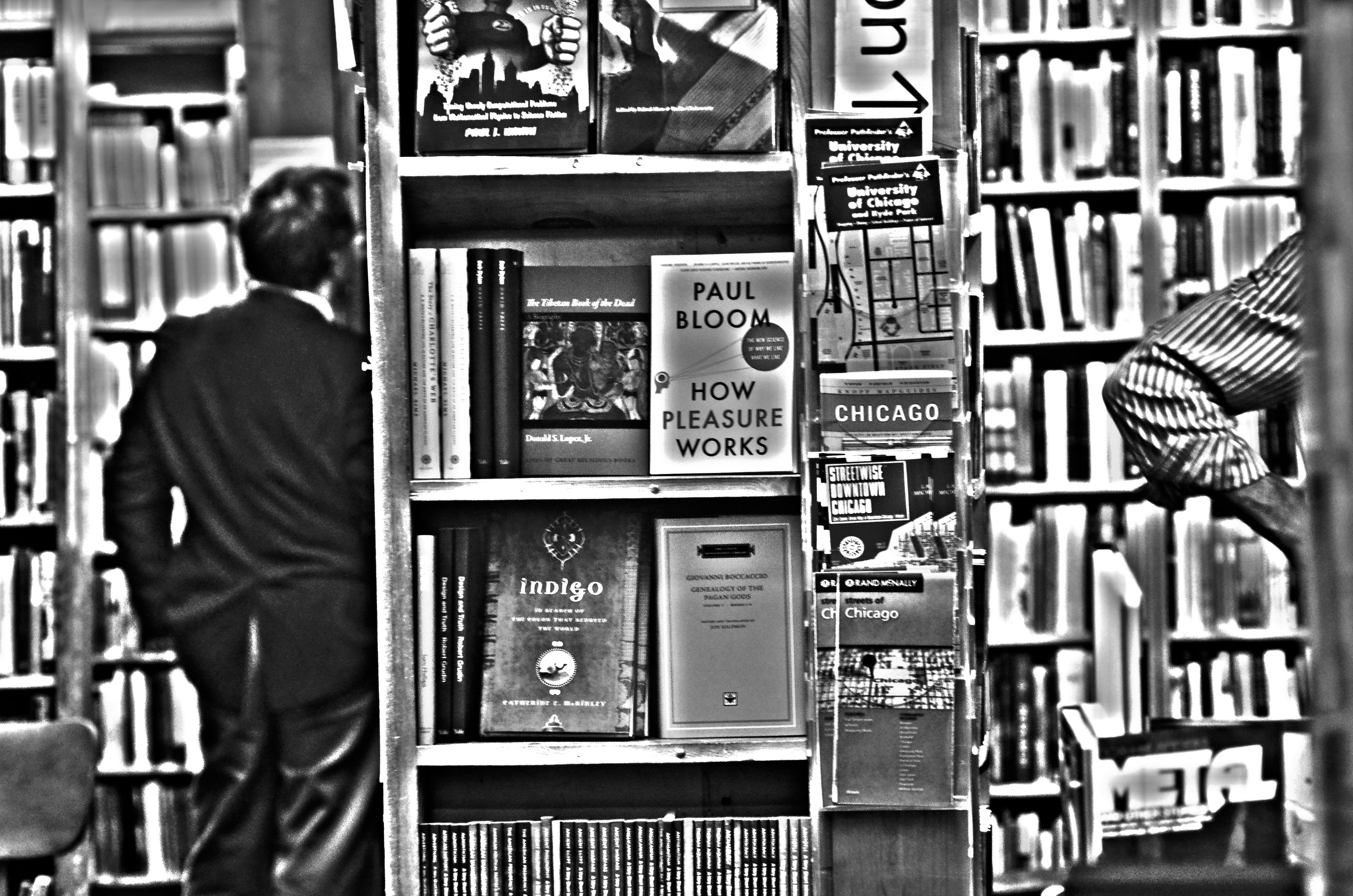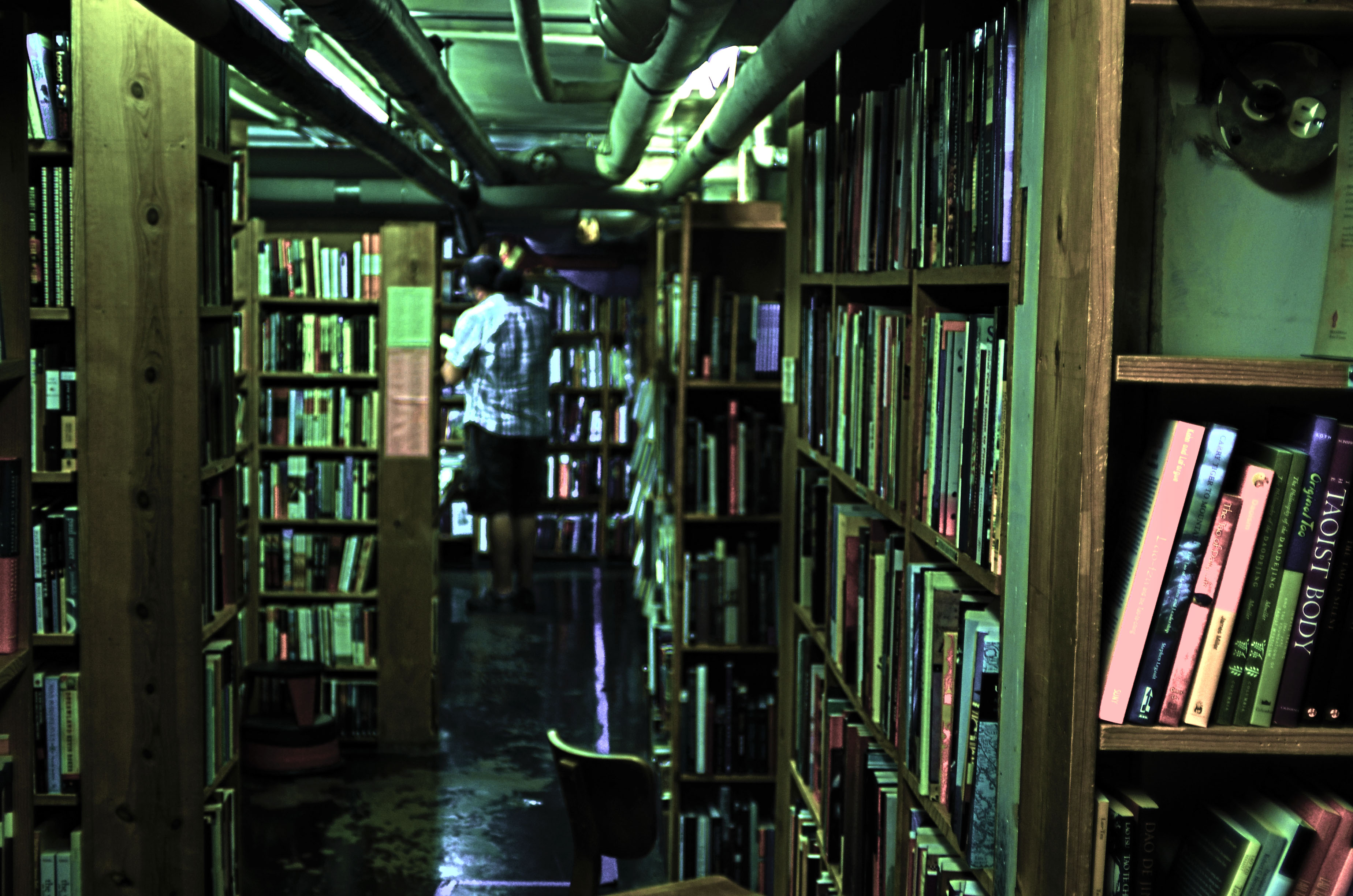| « Douglas Kearney @ Harriet Reading Series | Amina Gautier @ Women and Children First » |
Feature Wed Sep 21 2011
Landmark Seminary Co-op Bookstore, 50 Years Young
This October, the Seminary Co-op will celebrate its 50th birthday, and within a year it will say goodbye to its cherished home in the basement of the Chicago Theology Seminary -- a winding and seemingly endless labyrinth of books. This is the final installment of a three-part series on the bookstore; read parts one and two, detailing the Co-op's history and how the publishing industry has changed.
Part Three: The Stories
"I'm quite high on our customers."
And Co-op manager, Jack Cella, has known some impressive ones.
"[Saul Bellow] used to come into the store a lot, and he liked to explore — you know what this place is like, it's a maze. He liked to go back and look to see what was being unpacked. He wandered to the back, and there was [an undergraduate employee] unpacking some books, and [she] felt a tap on her shoulder. I don't know how Saul got back there, because we have a little bungee cord blocking the way, but it doesn't do much. Apparently, he wound his way back there...and asked her what she was doing. She looks up, realizes who he is, and started crying -- it was such a shock!"
Running the best academic bookstore certainly has its perks, including unintended sneak peeks at the shortlist for the Pulitzer Prize. "There was a person on the selection committee, and I always knew what the nominees where because this person would come in and buy those books." Purposefully buying local, he added.
Long-time employee Heather Ahrenholz also has her fair share of stories to tell. "Every so often the President of the Dominican Republic shows up. This place is a nightmare for his secret service! He comes in with an entourage, and ships a couple thousand worth of books back to the Dominican Republic." A Co-op member for over 10 years, Ahrenholz has seen him at least three times since she's worked there.
"He cleans out our economics section."
Most of the Co-op's customers aren't famous, but they are fiercely loyal — to the Cooperative, the books, and to the people who make it what it is.
University of Chicago history professor Rachel Fulton Brown remembers the first time she ever set foot in the Co-op. "I was in Chicago for a job interview" in 1994, and "that winter was still the coldest I've ever experienced." Going down into the Co-op, everything (including interview worries), simply fell away.
The bookstore was a "treasure cave" of warmth and books. "It was the most comforting feeling, walking around this space. That just stayed with me forever."
Having studied in New York City, Cambridge and Oxford, Fulton Brown has browsed in the world's best. But the Co-op still trumps all.
New York's Labyrinth, built with an eye toward its Hyde Park model, "should have a similar feel, but it never did. It was always kind of dusty...Blackwell's [at Oxford] is pretty impressive, but it wasn't well organized. It was overwhelming in the wrong way. All the books were there, but you wouldn't know why they were there. At the Co-op they've created an environment so that why the books that are there makes sense."
Dianne Rothleder, who teaches at Northwestern University, couldn't agree more, especially when considering how the Internet's overabundance of information makes selectivity important. "With the Internet...[knowledge] isn't as organized. Local knowledge gets lost in efficiency. Especially with ideas, you want juxtaposition and accident. And Amazon is not juxtaposition and accident."
Rothleder fell in love with the Cooperative on her first visit back in the mid '80s. "Room after room after room. And every room was a beautiful new surprise...It's not just getting lost: There's sections you don't go to at a particular phase of your life, [but then] you discover new places...so you can actually map your life against parts of the bookstore."
After so many years of shopping at the Co-op — at times making "book trips" from South Bend — the high point came when she found her book displayed in the front room. This was a long-held dream. Even as a graduate student, Rothleder mused that one day, she would write a book and it would be on the Cooperative's shelf.
"And then Jack put it out there for me! It was incredibly kind of him. Peak experience. Absolutely peak experience."
For Eric Lunde, the Seminary Co-op is like a good friend — "I've actually known it longer than some." An artist who moved from Milwaukee to Chicago in 1990 finds in his favorite bookstore not only the presence of a friend, but also a "weird source of identity. It's what I identify Hyde Park with. It's an institution."
If the store is an institution, so are those who bring it to life. Paul Schyve, a former clinical psychiatrist who discovered the Co-op in 1987, knows this firsthand. "Jack and others are just an unbelievable resource in terms of knowledge of the books. I don't know how many times I've walked in and I said, 'Jack, there's this book on such-and-such a topic, and I can't remember the author and I can't remember the title, can you help me find it?' And he finds it. Invariably."
Author and founder of Third World Press, Haki Madhubutu, knows how true this is. "One of the secrets of the success of the [Co-op] is the management. [Jack] is probably one of the hardest working book-men I know of. And that kind of caring about books is what also keeps me coming back. You feel a certain way when you go in there -- you feel the seriousness, you feel the love, you feel the caring...Jack is probably the only man in books, that I know, that works just as hard as I do!"
Milwaukee lawyer Tom Reed, like many out-of-towners, makes a special trip to Chicago just to shop at the Co-op. Two or four times each year, he revisits this community — "not typical by any means...It's not just a bookstore, and it's not just a co-op. It's a special kind of intellectual community that's been formed there."
That community was made possible because of those behind the scenes, who "wander over the surface of all this book publishing, and with a pretty secure instinct, identify the books which really deserve the big readership...and to fly over the books which people aren't necessarily [going to be interested in]."
It's a skill not many have, and the result is an expertly crafted "place of discovery," exhibiting the "products of so many brilliant minds."
If you aren't humble before you walk in, you will be by the time you leave. And no one knows this better than Cella.
"I think a bookstore can be an education. What I often say to prospective employees that are being interviewed [is this]: No matter how much you think you know, all you have to do is look at the shelf in any good bookstore and you realize how little you've read. The more you read, the more you realize what you don't know. That's the interesting thing about it."
And that's the Co-op.
Previously:
Part One: the History
Part Two: The Changing Industry
This feature is supported in part by a Community News Matters grant from The Chicago Community Trust and the John S. and James L. Knight Foundation. More information here.












